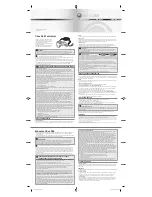
11
TriStar MPPT Operator’s Manual
2.4 Regulatory Information
NOTE:
This section contains important information for safety and
regulatory requirements.
The TriStar MPPT controller should be installed by a quali
fi
ed technician according to the electri-
cal rules of the country in which the product will be installed.
TriStar MPPT controllers comply with the following EMC standards:
• Immunity: EN61000-6-2:1999
• Emissions: EN55022:1994 with A1 and A3 Class B1
• Safety: EN60335-1 and EN60335-2-29 (battery chargers)
A means shall be provided to ensure all pole disconnection from the power supply. This discon-
nection shall be incorporated in the
fi
xed wiring.
Using the TriStar MPPT grounding terminal (in the wiring compartment), a permanent and reli-
able means for grounding shall be provided. The clamping of the earthing shall be secured
against accidental loosening.
The entry openings to the TriStar MPPT wiring compartment shall be protected with conduit or
with a bushing.
FCC requirements:
This device complies with Part 15 of the FCC rules. Operation is subject to the following two conditions: (1) This
device may not cause harmful interference, and (2) this device must accept any interference received, including
interference that may cause undesired operation.
Changes or modi
fi
cations not expressly approved by Morningstar for compliance could void the user’s authority to
operate the equipment.
Note:
This equipment has been tested and found to comply with the limits for a Class B digital device, pursuant to Part 15
of the FCC rules. These limits are designed to provide reasonable protection against harmful interference in a resi-
dential installation. This equipment generates, uses, and can radiate radio frequency energy and, if not installed and
used in accordance with the instruction manual, may cause harmful interference to radio communication. However,
there is no guarantee that interference will not occur in a particular installation. If this equipment does cause harmful
interference to radio or television reception, which can be determined by turning the equipment on and off, the user
is encouraged to try to correct the interference by one or more of the following measures:
• Reorient or relocate the receiving antenna.
• Increase the separation between the equipment and receiver.
• Connect the equipment into an outlet on a circuit different from that to which the receiver is connected.
• Consult the dealer or an experienced radio/TV technician for help.
This Class B digital apparatus complies with Canadian ICES-003.
Cet appareil numerique de la classe B est conforme a la norme NMB-003 du Canada.











































